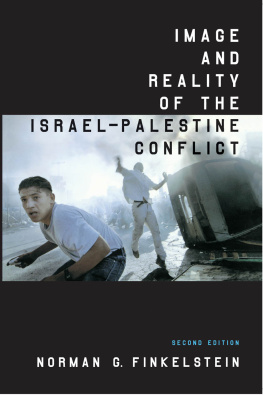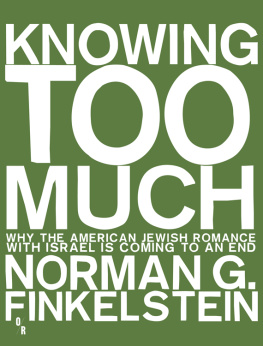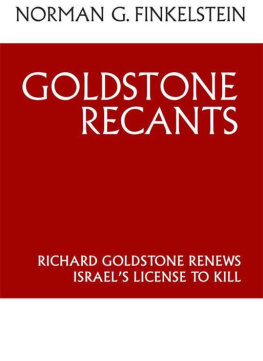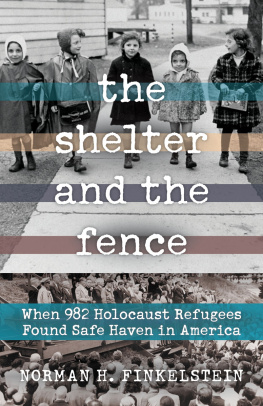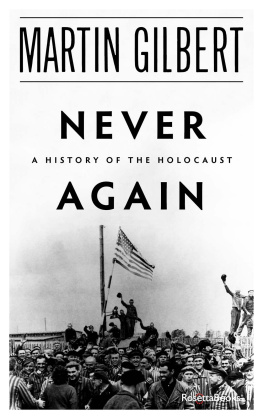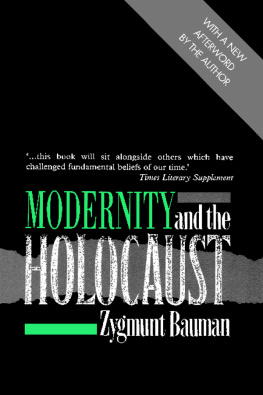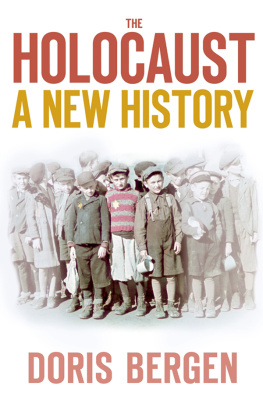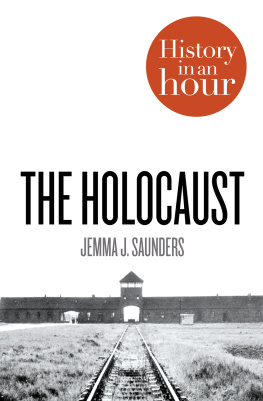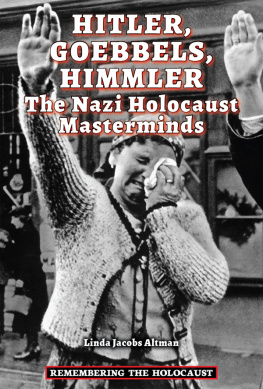A bestseller throughout Europe, the Middle East, and the Americas, and already translated into sixteen languages, The Holocaust Industry was hailed by the Guardian newspaper in London as the most controversial book of the year when it was originally published in 2000. In a devastating postscript for this second paperback edition, Norman G. Finkelstein documents the Holocaust industrys scandalous cover-up of the blackmail of Swiss banks, and in a new appendix demolishes an influential apologia for the Holocaust industry.
... its courageous attacks on the financial extortions of groups like the W[orld]J[ewish]C[ongress] are of great importance and, one hopes, will have an impact. Its strident tone, attacked by most of the books hostile critics, strikes me as highly appropriate, especially given the authors careful sourcing of most of his claims. Professor William Rubenstein, University of Wales
These fraudsters need to be unmasked, and Finkelstein believes that he is the man to do it. In 150 short pages he sets out to expose their machinations. If his indictment is a true one, it should prompt prosecutions, sackings, protest. The book shouts scandal. It is a polemic, communicated at maximum volume. The Times
... Finkelstein has raised some important and uncomfortable issues... examples cited... can be breathtaking in their angry accuracy and irony. Jewish Quarterly
Into this minefield, through which most have trodden perhaps a little too gingerly, has burst Norman Finkelstein, a Jew and a self-professed iconoclast, heretic and enemy of the American-Jewish establishment and he is lobbing grenades. The Spectator
... a short, sharp and copiously noted polemic. Times Higher Educational Supplement
Finkelstein is at his best when he skewers those who would sacralize the Holocaust. Los Angeles Times Book Review
... his basic argument that the memories of the Holocaust are being debased is serious and should be given its due. The Economist
... clever, explosive, sometimes even wryly funny. Salon
This is, in short, a lucid, provocative and passionate book. Anyone with an open mind and an interest in the subject should ignore the critical brickbats and read what Finkelstein has to say. New Statesman
... his allegations that some people are getting fat off the business sounds plausible and, if he is prepared to back it up, worth saying. Jewish Chronicle
He deserves to be heard... he is making some profound points that many younger and more thoughtful Jews have quietly been attempting to debate, but whose voices have been stilled by the establishment, particularly in the US. Evening Standard
Finkelsteins downright pugilistic book delivers a wallop mostly because few authors have had the courage or nerve to say, as he does, that the Nazi genocide has been distorted and robbed of its true moral lessons and instead has been put to use as an indispensable ideological weapon. Its a provocative thesis that makes you want to reject it even as you are compelled to keep reading by the strength of his case and the bravura of his assertions. LA Weekly
Finkelstein should be credited for writing a well-researched book that can help shut down the Holocaust Industry when the public becomes aware of its dishonesty and its vulgar exploitation of Jewish suffering. Z Magazine
He is scathing in his denunciation of the institutions and individuals who have cropped up around the issue of reparations in the last several years. New York Press
The reality of the Nazi holocaust remains. Memory can still enable us to recognise new victims, extend sensitivity and monitor signs of impending genocide. Books like The Holocaust Industry can help us if we let them. Red Pepper
Norman G. Finkelstein currently teaches political science at DePaul University in Chicago. He is the author of Image and Reality of the IsraelPalestine Conflict and (with Ruth Bettina Birn) A Nation on Trial, named a notable book for 1998 by the New York Times Book Review.
THE HOLOCAUST INDUSTRY
REFLECTIONS ON THE EXPLOITATION OF JEWISH SUFFERING
Second Paperback Edition

NORMAN G. FINKELSTEIN

First published by Verso 2000
Norman G. Finkelstein 2000
First paperback edition first published 2001
Norman G. Finkelstein 2001
Second paperback edition first published 2003
Norman G. Finkelstein 2003
All rights reserved
The moral rights of the author have been asserted
5 7 9 10 8 6
Verso
UK: 6 Meard Street, London W1F 0EG
USA: 180 Varick Street, New York, NY 100144606
Verso is the imprint of New Left Books
ISBN 1-84467-487-8
ISBN 978-1-84467-487-9
British Library Cataloguing in Publication Data
A catalogue record for this book is available from the British Library
Library of Congress Cataloging-in-Publication Data
A catalog record for this book is available from the Library of Congress
Typeset by SetSystems Ltd, Saffron Walden, Essex
Printed in Great Britain by William Clowes Ltd, Beccles, Suffolk
It seems to me the Holocaust is being sold it is not being taught.
Rabbi Arnold Jacob Wolf, Hillel Director, Yale University
Michael Berenbaum, After Tragedy and Triumph (Cambridge: 1990), 45.
CONTENTS
ACKNOWLEDGMENTS
Colin Robinson of Verso conceived the idea of this book. Roane Carey molded my reflections into a coherent narrative. At every stage in the books production Noam Chomsky and Shifra Stern provided assistance. Jennifer Loewenstein and Eva Schweitzer criticized various drafts. Rudolph Baldeo provided personal support and encouragement. I am indebted to all of them. In these pages I attempt to represent my parents legacy. Accordingly, the book is dedicated to my two siblings, Richard and Henry, and my nephew, David.
FOREWORD TO THE SECOND PAPERBACK EDITION
T his will almost certainly be my last word on the Holocaust industry. In prior editions of this book I said pretty much everything I wanted for many years to say: it was finally pardon the clich off my chest. On the other hand, I requested of my publishers, and they generously consented, to put out a second paperback edition focusing on the Swiss banks case. My main concern is to provide readers and, especially, future researchers with a clear picture of what happened and a guide to what to look for amid the heaps of disinformation. Regrettably, the trial record cannot be fully trusted. The presiding judge in the case elected for reasons not divulged but fairly simple to deduce not to docket crucial documents. In addition, the Claims Resolution Tribunal (CRT), which could have produced an objective assessment of the charges against the Swiss banks, also cant any longer be trusted. Midway in its work and heading towards vindicating the Swiss banks, the CRT was radically revamped by key figures in the Holocaust industry. Its only function now is to protect the blackmailers reputation. These developments are copiously documented in the new postscript for this edition. Using as my foil an authoritative account of the Holocaust compensation campaign, I present in the new appendix a comprehensive overview of this double shakedown of European countries and survivors of the Nazi holocaust. Although I would be most curious to read a refutation by someone from the Holocaust industry of my findings, I suspect again, for reasons not difficult to discern that none will be forthcoming. Yet silence, as my late mother used to say, is also an answer.


